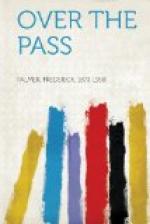They went to a restaurant of reputation, which Jack said was in keeping with the occasion when a man changed his habits from Arizona simplicity to urban multiplicity of courses. And what did Burleigh like? Burleigh admitted that if he were a plutocrat he would have caviar at least once a day; and caviar appeared in a little glass cup set in the midst of cracked ice, flanked by crisp toast. After caviar came other things to Burleigh’s taste. He was having such an awesomely grand feast that he was tongue-tied; but Jack could never eat in silence until he had forgotten how to tell stories. So he told Burleigh stories of the trail and of life in Little Rivers in a way that reflected the desert sunshine in Burleigh’s eyes. Burleigh thought that he would like to live in Little Rivers. Almost anyone might after hearing Jack’s description, in the joy of its call to himself.
“Now, if you would trust me,” said Burleigh, when they left the restaurant, “I should like to send out for some cloths not in stock for a couple of suits. And couldn’t I make you up three or four fancy waistcoats, with a little color in them—the right color to go with the cloth? You can carry a little color—decidedly, yes.”
“Yes, I rather like color,” said Jack, succumbing to temptation, though he felt that the heir to great responsibilities ought to dress in the most neutral of tones.
“And I should like to select the ties to go with the suits and a few shirts, just to carry out my scheme—a kind of professional triumph for me, you see. May I?”
“Go ahead!” said Jack.
“And you can depend on your evening suit to be up in time. But I am going to rush a little broader braid on those ready-made trousers—you can carry that, too,” Burleigh concluded.
When they parted Jack turned into Fifth Avenue. Before he had gone a block the bulky eminence of a Fifth Avenue stage awakened his imagination. How could anybody think of confinement in a taxicab when he might ride in the elephant’s howdah of that top platform, enjoying mortal superiority over surrounding humanity? Jack hung the howdah with silken streamers and set a mahout’s turban on the head of the man on the seat in front of him, while the glistening semi-oval tops of the limousines floating in the mist of the rising grade from Madison Square to Forty-second Street, swarmed and halted in a kind of blind, cramped pas de quatre from cross street to cross street, amid the breaking surge of pedestrians.
“Such a throbbing of machine motion,” he thought, “that I don’t see how anybody can have an emotion of his own without bumping into somebody else’s.”
It was a scene of another age and world to him, puzzling, overpowering, dismal, mocking him with a sense of loneliness that he had never felt on the desert. Could he ever catch up with this procession which had all the time been moving on in the five years of his absence? Could he learn to talk and think in the regulated manner of the traffic rules of convention? The few chums of his brief home school-days were long away from the fellowship of academies; they had settled in their grooves, with established intimacies. If he found his own flock he could claim admission to the fold only with the golden key of his millions, rather than by the password of kindred understanding.




